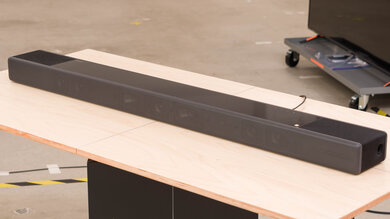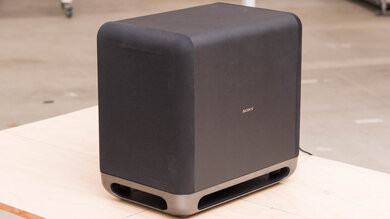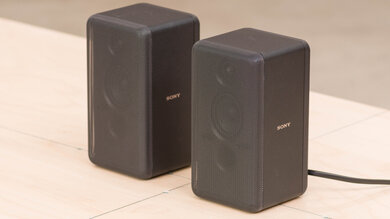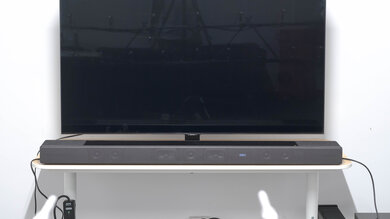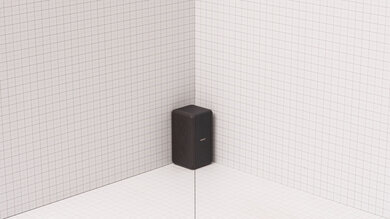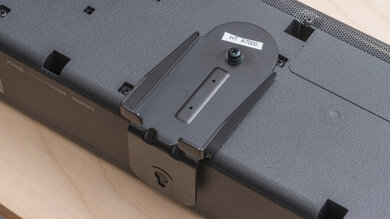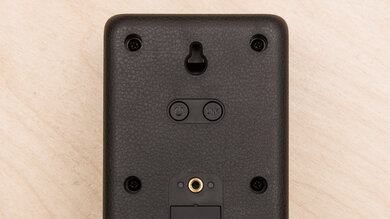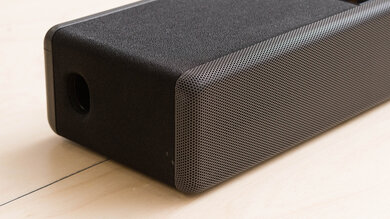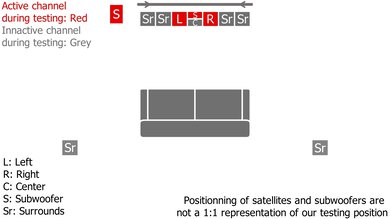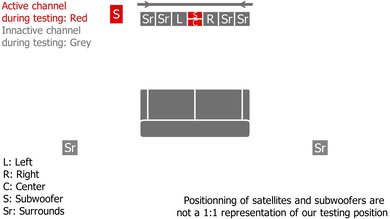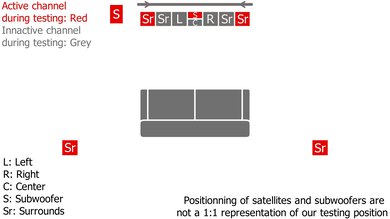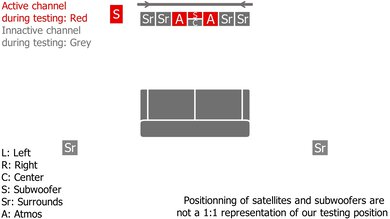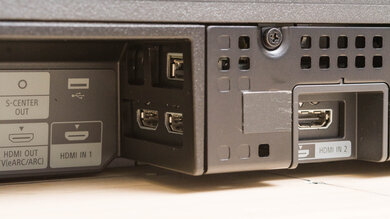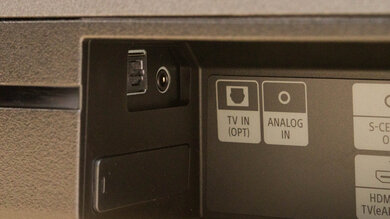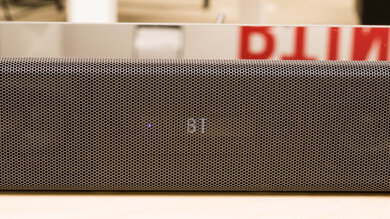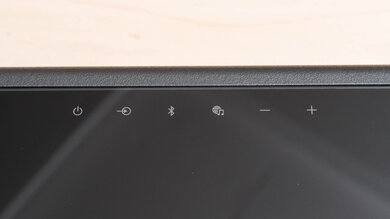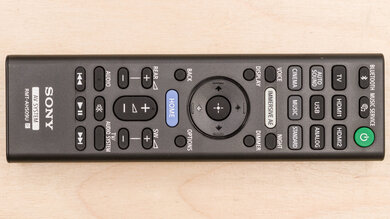The Sony HT-A7000 with Speakers + Bass Module is a premium 7.1.2 setup released in 2021. According to the manufacturer, the bar has Sony's Vertical Surround Engine and S-Force Pro Front Surround technologies for a more immersive listening experience. The SA-SW5 subwoofer helps reproduce more thumpy low-bass than the standalone bar. Its frequency response is pretty neutral, though vocals and lead instruments can be slightly muddy. However, compared to other premium models, it doesn't offer a lot of sound customization features such as a graphic EQ or bass and treble adjustments.
Note: The standalone Sony HT-A7000 is compatible with both the SA-SW5 and the SA-SW3 subwoofers. Our results are only valid for the SA-SW5 subwoofer. Since the dedicated subwoofer and the integrated subwoofer work in tandem rather than individually through separate channels, we can confirm this is a 7.1.2 setup.
Our Verdict
The Sony HT-A7000 with Speakers + SW5 Bass Module is good for mixed usage. This setup has a Sound Field Optimization room correction feature to optimize audio reproduction based on your room's acoustics. It has a pretty neutral sound profile suitable for most audio content, though vocals and lead instruments can be muddy and muffled. It has a good surrounds performance, and it supports Dolby Atmos content. However, aside from a subwoofer level adjustment, there aren't many options for sound customization.
-
Subwoofer level adjustment.
-
Room correction feature.
-
Very good surrounds performance.
-
Doesn't get very loud.
-
No graphic EQ or bass and treble adjustments.
The Sony HT-A7000 with Speakers + SW5 Bass Module is great for dialogue-centric content like TV shows. Thanks to its discrete center, dialogue is accurately localized within the soundstage. Its sound profile is pretty neutral, though vocals can be a bit muddy or muffled. There's a dialogue enhancement feature available to make voices more clear and crisp, though.
-
Dialogue enhancement feature.
-
Auto-volume mode.
-
Doesn't get very loud.
The Sony HT-A7000 with Speakers + SW5 Bass Module is satisfactory for music. This setup has a Sound Field Optimization room correction feature to optimize audio reproduction based on your room's acoustics. On its 'Standard Surround' mode, it has a pretty neutral sound profile suitable for most music genres. However, vocals and lead instruments can sound a bit muddy and pushed to the back of the mix. We found that its 'Music' preset is better-suited for listening to music. While there's a subwoofer volume adjustment feature, it lacks more premium customization features like a graphic EQ.
-
Subwoofer level adjustment.
-
Room correction feature.
-
Doesn't get very loud.
-
No graphic EQ or bass and treble adjustments.
The Sony HT-A7000 with Speakers + SW5 Bass Module is good for movies. On 'Standard Surround', it can reproduce the deep rumbling in action-packed movies clearly, and its 'Cinema' preset can create a more immersive sound. Its discrete satellites help to more clearly and accurately represent surround objects in the soundstage. It supports Dolby Atmos content, too, though its performance isn't as impressive as some of the other premium models we've tested.
-
Room correction feature.
-
Very good surrounds performance.
-
Doesn't get very loud.
- 7.7 Mixed Usage
- 8.0 Dialogue/TV Shows
- 7.4 Music
- 7.6 Movies
Changelog
-
Updated Oct 18, 2024:
The Compared section has been updated to mention the Sony BRAVIA Theater Bar 9 with Speakers + Bass Module.
- Updated Sep 14, 2023: Updated text in Video Passthrough to TV box for clarity. No changes in test results.
- Updated Sep 11, 2023: Updating the bar to firmware version 1.779 adds support for ALLM and HDMI Forum. The Video Passthrough to TV score improves from 8.4 to 9.5 as a result.
- Updated Jun 14, 2023: After TBU 1.2, added more information to the Video Passthrough to TV box to clarify our results.
- Updated Jun 13, 2023: Converted to Test Bench 1.2. Updated the results for audio format support via ARC/eARC, HDMI In, and Optical. Added Video Passthrough to TV results as well.
Differences Between Sizes And Variants
The Sony HT-A7000 with SA-RS3S Speakers + SW5 Bass Module is available in 'Black'. You can see the label for the model we tested here. You can also find this setup with Sony's SA-SW3 subwoofer. However, we haven't tested the bar in this configuration, so we can't confirm its performance.
If you come across another version of this soundbar, let us know in the discussions, and we'll update our review.
Compared To Other Soundbars
The Sony HT-A7000 with Speakers + Bass Module is a premium 7.1.2 setup. You can also purchase the standalone Sony HT-A7000 if you prefer. It offers a very immersive surrounds performance, and it supports Dolby Atmos content. Compared to other premium models like the Bose Smart Soundbar 900 and the Sony HT-A9, it's not quite as immersive-sounding. That said, despite the manufacturer's production of subsequently newer soundbars, the HT-A7000 with Speakers + Bass Module can still go toe to toe with successors like the Sony BRAVIA Theater Bar 9 with Speakers + Bass Module with similar audio format support and even an extra HDMI In and Optical port, so you can hook up more devices.
See also our recommendations for the best soundbars, the best soundbars with subwoofer, and the best Dolby Atmos soundbars.
The Sony HT-A7000 with Speakers + Bass Module is better than the standalone Sony HT-A7000. Thanks to its dedicated subwoofer, the full setup can reproduce a more extended low-bass than the bar on its own. Also, its discrete satellites help to more clearly and accurately represent surround objects, so the full setup has a better surrounds performance.
While the Sony HT-A7000 with Speakers + Bass Module and the Samsung HW-Q990C are both very premium models, the Samsung is better overall. The Samsung has a more even and balanced sound across the range, offering a better performance with Dolby Atmos content. Plus, it gets louder than the Sony, with less compression at max volume. There are more customization tools, too, including bass and treble adjustments to switch up its sound.
The Sony HT-A7000 with Speakers + Bass Module is better than the Sony HT-G700. The HT-A7000 is a better-built 7.1.2 setup with discrete satellites. It has better soundstage and surround performances. Also, it can reproduce a more extended low-bass. There's even some more sound enhancement features, including room correction.
The Samsung HW-Q990B is better than the Sony HT-A7000 with Speakers + Bass Module. The Samsung has better surround sound and Dolby Atmos performances, meaning that sound effects are more clear and present in the mix. It gets louder with less compression at max volume, too. With its graphic EQ, it's more customizable, too. The Sony is still a very premium bar with a versatile performance.
The Sony HT-A9 with Bass Module and the Sony HT-A7000 with Speakers + Bass Module are both premium setups. The HT-A9 has a unique design that may be more suitable for users with less space in their setup. It also has better soundstage and Atmos performances. That said, the HT-A7000 has a better center channel performance, and it can reproduce a more extended low-bass with the same subwoofer.
The Bose Smart Soundbar 900 with Speakers + Bass Module is better than the Sony HT-A7000 with Speakers + Bass Module. Both are very premium setups, but the Bose has better soundstage, center, and Atmos performances. It also gets louder than the Sony. That said, unlike the Bose, the Sony offers DTS support and a Full HDMI In port for high-quality passthrough.
The Samsung HW-Q930B is better than the Sony HT-A7000 with Speakers + Bass Module. The Samsung has better surround and Atmos performances, so sound effects in your favorite movies are more clear and accurate in the mix. Its graphic EQ gives you more ability to customize its sound. It gets louder with less compression at max volume, too, so it's better suited for listening in larger rooms.
The Sennheiser AMBEO Soundbar MAX is better than the Sony HT-A7000 with Speakers + Bass Module. The Sennheiser is a 5.1.4 soundbar with a standalone design. It has a better Atmos performance and gets louder with less compression at max volume. Its large, heavy design may not be ideal for all users. The 7.1.2 Sony has a dedicated sub and satellites and can reproduce a little more bass out-of-the-box. Its surround and soundstage performances are better, too.
The JBL Bar 9.1 and the Sony HT-A7000 with Speakers + Bass Module are both premium soundbars, but the JBL is a bit better. The 5.1.4 JBL has better soundstage, center, and Atmos performances. It also gets louder than the Sony. That said, the Sony is better built.
Depending on your listening habits, you may prefer either the Sony HT-A7000 with Speakers + Bass Module or the LG S95QR. They're both premium Dolby Atmos soundbars, though the LG gets louder. Its bass-heavy default sound isn't ideal for everyone, especially compared to the Sony's more neutral sound out-of-the-box. That said, you can easily customize the LG to get a similar sound with its bass and treble adjustments.
Depending on your listening habits, you may prefer either the Sony HT-A7000 with Speakers + Bass Module or the standalone Sonos Arc. The Sony is a 7.1.2 setup with discrete satellites and a subwoofer. It's better built, with a better surround performance. Unlike the Sonos, it has two Full HDMI In ports for high-quality passthrough. That said, the Sonos has better soundstage and Atmos performances. You can also upgrade it with a sub and satellites for better performance.
The Sonos Arc with Sub + One SL Speakers is better than the Sony HT-A7000 with Speakers + Bass Module. Both setups have premium builds and versatile performances, but the Sonos has better soundstage, surround, and Atmos performances. It also gets louder with less compression at max volume. However, only the Sony has a Full HDMI In port for high-quality passthrough.
The Sony HT-A7000 with Speakers + Bass Module is better than the Sony HT-Z9F. The HT-A7000 is a 7.1.2 setup with discrete satellites that's better built. It has better soundstage, surround, and Atmos performances, and it can reproduce a more extended low-bass. There are also more sound enhancement features available, including room correction and Apple AirPlay support. That said, the 3.1 HT-A9F does get louder with less compression at max volume.
The Sony HT-ST5000 and the Sony HT-A7000 with Speakers + Bass Module are both premium 7.1.2 setup. The HT-A7000 comes with discrete satellites, and it offers a better surrounds performance. Unlike the HT-ST5000, it has a room correction feature and Apple AirPlay 2 support. However, the HT-ST5000 has better center and Atmos performances. It also gets louder with less compression at max volume.
Depending on your listening habits, you may prefer either the Bose Smart Soundbar 700 with Speakers + Bass Module or the Sony HT-A7000 with Speakers + Bass Module. The Bose is a 5.1 setup with better soundstage and center channel performances. It can get louder than the Sony, and it also reproduces a more extended low-bass. Some users may also prefer its more neutral sound profile out-of-the-box. However, only the Sony supports Dolby Atmos content. Unlike the Bose, it also has a Full HDMI In port for high-quality passthrough.
The LG SP9YA and the Sony HT-A7000 with Speakers + Bass Module are both very premium setups, so depending on your listening habits, you may prefer one over the other. The Sony is a 7.1.2 setup with discrete satellites that's better built. It offers a better surrounds performance. However, the 5.1.2 LG gets louder with less compression at max volume, and it has more sound enhancement features, including bass and treble adjustments.
The Sony HT-A7000 with Speakers + Bass Module and the Samsung HW-Q800B are both premium Dolby Atmos soundbars. The Sony is better for surround sound, as its rear speakers bring a more clear and real feel to multi-channel content. That said, it's not quite as customizable as the Samsung, which has lots more sound enhancement features. The Samsung's Atmos performance is better, too.
The Klipsch Cinema 1200 is better than the Sony HT-A7000 with Speakers + Bass Module. The Klipsch is a 5.1.4 setup that gets louder with less compression at max volume. It comes with a graphic EQ to help you customize its sound, and it can reproduce a more extended low-bass than the Sony. That said, the Klipsch has a bass-heavy sound, so you need to customize it if you want a more neutral sound profile. Also, unlike the Sony, it doesn't have room correction, and it doesn't support DTS content.
The Sony HT-A7000 with Speakers + Bass Module is better than the standalone Sony HT-A9. The HT-A7000 comes with a dedicated subwoofer that helps reproduce a more extended low-bass. It's better built, and it also has better center and surround performances. That said, the 4.0.4 HT-A9's unique design may be preferable for some users. It also offers better soundstage and Atmos performances. You can even upgrade the HT-A9 with a subwoofer if you prefer.
The Sonos Ultimate Immersive Set with Arc is better than the Sony HT-A7000 with Speakers + Bass Module. They're both very premium setups, but the Sonos has a better sound. It gets louder and offers a more even frequency response, so sound effects are clearer and more present in the mix. Plus, the up-firing channels on its satellites give a more clear and real feel to height content like Atmos. The Sony does have Bluetooth support, though, unlike the Sonos, as well as HDMI In ports for video passthrough.
The LG SP11RA and the Sony HT-A7000 with Speakers + Bass Module are both very premium setups, but the LG scores better overall. The LG is a 7.1.4 setup with better center and Atmos performances. It can get louder, and it has more sound enhancement features, including bass and treble adjustments. However, the 7.1.2 Sony is better built. It also offers a better surrounds performance, which some users may prefer.
The Sony HT-A7000 with Speakers + Bass Module and the LG S90QY with SPQ8-S Speaker Kit are both versatile Dolby Atmos setups with rear speakers. The Sony offers a more balanced sound out of the box. However, the LG comes with some more sound customization tools, including bass and treble adjustments. It performs better at max volume, too.
The Polk Audio Magnifi Max AX SR and the Sony HT-A7000 with Speakers + Bass Module are both 7.1.2 setups with different strengths. The Sony is a better-built setup that comes with more sound enhancement features, such as room correction. Its stereo soundstage is better, too, and it brings a more immersive sound with height content. However, the Polk Audio gets much louder with less compression at max volume.
Depending on your listening habits, you may prefer either the Sony HT-A7000 with Speakers + Bass Module or the Nakamichi Shockwafe Pro 7.1 SSE. The Sony is a better-built setup with eARC support. It has more sound enhancement features like room correction and a more neutral sound out-of-the-box. The Nakamichi gets louder, though, with less compression at max volume. It also has better surround and Atmos performances.
The Samsung HW-Q800A and the Sony HT-A7000 with Speakers + Bass Module are both premium setups. The Samsung is a 3.1.2 setup that has a better center performance and can get louder. However, the 7.1.2 Sony is better built. It comes with discrete satellites, and it offers a better surrounds performance.
The Samsung HW-Q900A is a better 7.1.2 setup than the Sony HT-A7000 with Speakers + Bass Module. The Samsung has better center and Atmos performances. It can get louder, too, with less compression at max volume. Also, it offers more sound customization features, including a graphic EQ as well as bass and treble adjustments. That said, the Sony is still a premium setup that's better built and comes with satellites. It offers a better surrounds performance.
The Samsung HW-Q950A is better than the Sony HT-A7000 with Speakers + Bass Module. The Samsung is an 11.1.4 setup that's better built. It has better center, surround, and Atmos performances, and it gets louder with less compression at max volume. There are also some more sound enhancement features available, including bass and treble adjustments as well as a graphic EQ.
The Vizio M Series M512a-H6 and the Sony HT-A7000 with Speakers + Bass Module are both very versatile setups, but the Vizio scores better overall. The Vizio gets louder than the Sony with less compression at max volume. It has a better soundstage and can reproduce a bit more low-bass. However, the Sony has more sound enhancement features and a significantly better surround sound performance.
The Samsung HW-Q950T is better than the Sony HT-A7000 with Speakers + Bass Module. The Samsung is a 9.1.4 setup with better center and Atmos performances. It can also get louder with less compression at max volume. That said, the Sony is still a very premium setup. It's better built, and it offers more wireless playback options.
The Sony HT-A7000 with Speakers + Bass Module and the Bose Smart Soundbar 900 are both premium setups with versatile overall performances. The Sony's full setup comes with a subwoofer and satellites. It can reproduce a more extended low-bass and has a better surrounds performance. Also, there are two Full HDMI In ports for high-quality passthrough. That said, the standalone Bose takes up less space. It has better Atmos and soundstage performances and gets louder with less compression at max volume. You can upgrade it with a sub and satellites down the line if you want.
The LG SN11RG and the Sony HT-A7000 with Speakers + Bass Module are both very premium setups, but the LG scores better overall. The LG has a better Atmos performance, and it gets louder with less compression at max volume. Also, it offers more sound enhancement features, including bass and treble adjustments. That said, the Sony is better built with a better surrounds performance.
Depending on your listening habits, you may prefer either the Klipsch Cinema 800 or the Sony HT-A7000 with Speakers + Bass Module. The Sony is a better-built 7.1.2 setup with discrete satellites. It's better for movies, thanks to its Atmos and surround performances. Unlike the Klipsch, it also supports DTS content. That said, the Klipsch is still a really good choice for dialogue-heavy content and music. It can reproduce a more extended low-bass, and it can get louder with less compression at max volume.
Test Results
The Sony HT-A7000 with Speakers + SW5 Bass Module has a sleek design. The bar is mostly made of high-quality plastic, and there's a metal grille in front to protect the drivers inside. The touch-capacitive glass top gives it a very high-end feel, though the fabric covering the up-firing drivers on top is pinchable. Unlike the Sony HT-ST5000, you can't remove the front grille to expose the drivers, but the grille is transparent enough that you can see the drivers behind it.
The SA-SW5 subwoofer is mostly made of hard plastic with a leather-like texture and has fabric covering the sides. There's a front-firing driver behind the front fabric and a down-firing driver at the bottom of the sub. There are also two additional subwoofers integrated into the bar.
The Sony HT-A7000 with Speakers + SW5 Bass Module has an excellent build quality. Overall, it has a very premium feel. The bar and the satellites have a similar build, with solid plastic and metal grilles to protect the drivers inside. The bar also has a glass top and some nice-quality fabric covering the up-firing drivers. The subwoofer feels very high-end, too, and it's mostly plastic with a fabric covering the sides.
The Sony HT-A7000 with Speakers + SW5 Bass Module has a great stereo frequency response. Its frequency response is pretty neutral, though vocals and lead instruments may be slightly muddy and muffled at times. There's a dip between the mid-bass and the high-bass that represents the weak hand-off between the sub and the bar itself. With real-life content, you may notice this as a hole in the soundstage.
This setup comes with a Sound Field Optimization room correction feature that you can activate when the bar is connected to your TV. This feature works automatically, but you can also manually enter your room's dimensions to calibrate the bar. We tested using the automatic Sound Field Optimization feature. However, we also tried the manual configuration and found it was a bit less loud than the automatic calibration, but the frequency response curves were identical. While these results may be unique to our testing room, we feel that the automatic calibration will be sufficient for most users.
Note: We performed all of our sound tests with the bar set to 'Standard Surround' mode. During our subjective listening tests, we found that the 'Music' preset was better suited to listening to music, as sound seemed less diffused.
The Sony HT-A7000 with Speakers + SW5 Bass Module has a subwoofer volume adjustment to help you customize its sound. We tested the bar's stereo frequency response at several different settings. However, if you prefer a more neutral sound, we recommend using its default subwoofer level of '6'.
The Sony HT-A7000 with Speakers + SW5 Bass Module has a good stereo soundstage. The soundstage is perceived to be about as wide as the bar itself. However, at times, it seems like sound is coming from behind the bar. Also, its focus isn't very accurate, especially compared to other premium models like the Bose Smart Soundbar 900. Sound objects seem to come from a general area rather than an accurate, pinpoint location.
The Sony HT-A7000 with Speakers + SW5 Bass Module has a mediocre stereo dynamics performance. The bar doesn't get very loud, so it's not really ideal to use in large rooms or at crowded parties. There's also some compression when you push it to max volume. For a bar that gets even louder, check out the Nakamichi Shockwafe Pro 7.1 SSE.
The Sony HT-A7000 with Speakers + SW5 Bass Module has a good stereo THD performance. At a normal listening volume, the amount of distortion is within good limits, resulting in clean and pure audio reproduction. However, if you push the bar to max volume, there's a jump in THD. You may not notice this with real-life content, though.
Update 11/25/2021: We conducted a subjective listening test with the Acoustic Center Sync feature and added it to the text.
The Sony HT-A7000 with Speakers + SW5 Bass Module has a good center performance. This 7.1.2 setup has a discrete center channel that helps to more accurately localize voices to a pinpoint location within the sound image.
You can also connect this soundbar with your compatible BRAVIA TV to activate Acoustic Center Sync, which uses the TV speakers as a discrete center channel. We found that this feature seems to anchor dialogue more vertically, so it seems closer to the characters on the screen. However, it also seems to decrease the overall sound quality, resulting in a less immersive sound. There also appeared to be a difference in volume between the TV and the soundbar with Acoustic Center Sync activated. As a result, some users may prefer not to use this feature.
The Sony HT-A7000 with Speakers + SW5 Bass Module has a very good surrounds performance. The SA-RS3S satellites have a discrete localization, which helps to more accurately and clearly represent surround objects in the soundstage. Sound seems like it's coming from all around you, rather than just from speakers placed in front of you.
The Sony HT-A7000 with Speakers + SW5 Bass Module has up-firing drivers in the bar, which bounce sound off the ceiling and back toward you to simulate height. However, there aren't any up-firing drivers in the satellites, so sound only comes from the bar itself. Also, the phantom localization doesn't sound as clear and real as the discrete localization provided by home theater setups.
In our subjective listening tests, we found that the 'Cinema' mode creates a more immersive experience when listening to Atmos content. However, the immersion wasn't as impressive as some of the other bars we've tested, such as the Sony HT-A9 with Bass Module and the Sonos Ultimate Immersive Set with Arc.
The Sony HT-A7000 with Speakers + SW5 Bass Module has an impressive selection of sound enhancement features. There are some EQ presets to help you customize its sound, including 'Standard Surround', 'Music', 'Cinema', and 'Auto Sound'. You can also adjust the subwoofer volume. The 'Immersive AE' feature activates the up-firing channels to add height to your audio, and this feature is locked on when you watch Atmos content on 'Standard Surround' mode. However, it lacks some more common tools like bass and treble adjustments, which you can find with other 7.1 bars like the LG S90QY with SPQ8-S Speaker Kit.
This setup also has a Sound Field Optimization room correction feature. To access this feature, you need to connect the bar to your TV. You can see a clip of the setup process here.
Updating the bar to firmware version 1.278 adds support for Sony's 360 Spatial Mapping feature. It creates a slightly more immersive sound, adding more of a feeling of sound coming from above you. If you already have Sound Field Optimization turned on, the firmware update automatically turns this feature on - though you need the full setup with satellites for it to work. You can also turn it off in the bar's menu on your TV if you want.
The Sony HT-A7000 with Speakers + SW5 Bass Module comes with many physical inputs. You can connect it to your TV using its HDMI or Optical ports. Also, there are Full HDMI In ports with HDMI 2.1 support, but keep in mind that this doesn't mean that it's capable of VRR passthrough.
Also, the bar has an S-Center Out port that lets you plug the bar into a compatible BRAVIA TV for Acoustic Center Sync. This feature syncs your TV speakers with the bar, so the sound matches what you see on the screen more accurately.
The Sony HT-A7000 with Speakers + SW5 Bass Module has fantastic audio format support via ARC. It supports standard surround formats like Dolby Digital as well as object-based and lossless audio formats.
Via Full HDMI In, the Sony HT-A7000 with Speakers + SW5 Bass Module supports standard surround sound formats like Dolby Digital. You can also playback object-based and lossless formats like Dolby Atmos and DTS:X.
Via Optical, the Sony HT-A7000 with Speakers + SW5 Bass Module supports Dolby Digital and DTS content. You can often find these surround sound formats on Blu-rays and streaming platforms.
The Sony HT-A7000 with Speakers + SW5 Bass Module has a great latency performance. It has fairly low latency, so you shouldn't notice a delay between the audio you hear and the video you see. As a result, it's suitable for watching videos and movies over these connections. The manufacturer also says that the AV SYNC feature can help reduce latency regardless of whether or not your bar is paired to a BRAVIA TV. Some apps and TVs may compensate for latency differently, though, so your real-world experience can vary.
The bar supports video passthrough when connected as a hub between devices like a PC and a TV. It supports most common resolutions and refresh rates, which is great for gaming. Updating the bar to firmware version 1.779 adds support for HDMI Forum VRR and ALLM passthrough. Plus, the update allows you to passthrough 4K @ 120Hz @ 10-bit @ 4:4:4 for PC gaming and gaming with certain consoles.
The Sony HT-A7000 with Speakers + SW5 Bass Module lets you wirelessly stream audio to the bar from your mobile devices over lots of different wireless playback formats. The manufacturer also says that it supports Spotify Connect.
The Sony HT-A7000 with Speakers + SW5 Bass Module doesn't have voice assistant support built into the bar. If you want to activate the bar with your voice, you need to pair it with a third-party voice assistant device like an Amazon Echo. The manufacturer says that it supports Amazon Alexa and Google Assistant-enabled devices.
Comments
Sony HT-A7000 with Speakers + Bass Module: Main Discussion
Let us know why you want us to review the product here, or encourage others to vote for this product.
We’ve purchased the product and are waiting for it to arrive in our lab.
- 32120
Hi can you test the transparency mode and compare with something that priced similar?
- 32120
Hi, Can you check latency with and without game mode?
- 32120
Hey, these earbuds have a safe volume feature that measures the sound intensity in the ear and ensures it’s below a set limit. Can you test how accurate the decibel meter really is?
- 32120
I am only interested in ANC as on flights my WH-1000XM5s let through noise and if you lie against the window the headband vibrates. I can’t justify WFs for just this so am looking between these, linkbud S and Soundcore Space A40. Next flight is in a couple weeks so fingers crossed the lab data is out by then 🤞🏾
- 21010
Can you compare liberty 4 nc with the JBL live pro 2? Both of these are quite competitive in the under $100 earbuds range.
- 54340
I am only interested in ANC as on flights my WH-1000XM5s let through noise and if you lie against the window the headband vibrates. I can’t justify WFs for just this so am looking between these, linkbud S and Soundcore Space A40. Next flight is in a couple weeks so fingers crossed the lab data is out by then 🤞🏾
From my experience, their ANC performance seems to be similar to that of the Sony Linkbuds S. But the Liberty 4 NC has a constant white noise going on when the environment is not as loud, while the Sony ones are completely silent in that regard. Sadly, the Linkbuds nor the A40 fit my ears comfortably, so I only use the Liberty 4 NC. I have no real experience with the Space A40, because they would not stay in my ear for even a minute😅.
If fit wasn’t a concern, I would have kept the Linkbuds for sure, as their only downside is their battery runtime if you have all available features enabled (Service Link, Assistant, LDAC, Speak to Chat, and DSEE Extreme). Without these features turned on, they last the tested time just fine; otherwise, the right bud will run out of power more quickly, as it seems to do most of the calculations.
The sound from the Liberty 4 NC is more bass-heavy than that of the Linkbuds S, but with the equalizer, I was able to get them to sound just right for me. Let’s see if the test will line up with my experience regarding the ANC similarity.
- 32120
From my experience, their ANC performance seems to be similar to that of the Sony Linkbuds S. But the Liberty 4 NC has a constant white noise going on when the environment is not as loud, while the Sony ones are completely silent in that regard. Sadly, the Linkbuds nor the A40 fit my ears comfortably, so I only use the Liberty 4 NC. I have no real experience with the Space A40, because they would not stay in my ear for even a minute😅. If fit wasn’t a concern, I would have kept the Linkbuds for sure, as their only downside is their battery runtime if you have all available features enabled (Service Link, Assistant, LDAC, Speak to Chat, and DSEE Extreme). Without these features turned on, they last the tested time just fine; otherwise, the right bud will run out of power more quickly, as it seems to do most of the calculations. The sound from the Liberty 4 NC is more bass-heavy than that of the Linkbuds S, but with the equalizer, I was able to get them to sound just right for me. Let’s see if the test will line up with my experience regarding the ANC similarity.
With mine, the white noise is significantly decreased (but still there) in LDAC mode. Maybe compare both modes in this regard?
- 21010
Can you please test the multipairing with Windows 11 and Android (maybe even Xiaomi FW). I feel like this isnt really working well and often times I need to manually connect/disconnect devices in order for them to work properly.
- 43230
We’ll be considering all the suggestions in this thread as we test this product!
- 32120
Can you please compare ANC (specifically against people talking) and Transparency (specifically your own voice) against AirPods Pro 1st Gen?
Thank you
Edited 1 year ago: More specific - 32120
I am only interested in ANC as on flights my WH-1000XM5s let through noise and if you lie against the window the headband vibrates. I can’t justify WFs for just this so am looking between these, linkbud S and Soundcore Space A40. Next flight is in a couple weeks so fingers crossed the lab data is out by then 🤞🏾
To me the ANC on Liberty 4 NC is much better than Buds 2 Pro, better than Space A40 but slightly worse than Bose QC Earbuds II. ANC is an important factor for me. And I’ve bought 7 different in ears/earbuds lately and 4 NC is right now number 2. Bose QC IIs are still king.
- 43230
Hello Staff When you will start testing the Liberty 4 NC?
- 21010
It would be awesome to know the difference in RAW frequency response during Normal, Noise Cancellation and Transparency modes. That way we can make informed EQ decisions for the various listening modes.
This may be too hard, but another thing I always wanted to know (which applies to basically all of Anker Soundcore TWS products) is how the EQ operates, like the Q value or bandwidth, slope and filter types, etc. In other words, how does gain boosts/cuts affect the various fixed bands and their surrounding frequencies. The Soundcore app seemingly has a very weird EQ system and I’d love to know how it actually modifies the sound, since it certainly is not your average or even common fixed-band EQ, judging from my experience with several of them.
Finally, the app has a “safe volume” function, which seemingly monitors the volume of the earbuds. During aa frequency sweep at a constant gain, this function displayed a change in gain during certain frequencies, as it technically should be due to headphones being “tuned” to a harman-like curve. This leads me to believe the volume metre in the app is more complicated that just some simple input-gain-to-db conversion. How accurate is this safe volume screen actually?
- 32120
Unfortunatelly, Liberty 4 (withoug “NC”) has very bad treble level. I had to return my one back to store. Maybe you could compare them regarding this feature.
- 10-100
Please compare Liberty 4 NC with Liberty 4 and clarify the improvement and drawbacks. Would love to see if it’s actually better than it’s multi driver predecessor.
Early access to our full test results is now available for Insiders! Become an insider to check it out here.
- 43230
Hi, when can we expect the full review to get published? Any approximate?
- 32120
Hi Can you post the review?
Edited 1 year ago: typo - 32120
Would you all be kind to release the full review to the public? Much appreciated!
- 32120
Would you all be kind to release the full review to the public? Much appreciated!
They are certainly taking their time with this one. FAQs say it’s around 3-5 days on average from when the early access is posted. This one is already half a month in and still going. I would think they were just milking it for insider subscriptions but they released the WF-1000XM5 within one week, which is even more popular. Hopefully we get an update.
- 21010
They are certainly taking their time with this one. FAQs say it’s around 3-5 days on average from when the early access is posted. This one is already half a month in and still going. I would think they were just milking it for insider subscriptions but they released the WF-1000XM5 within one week, which is even more popular. Hopefully we get an update.
There was a time that Rtings published reviews timely, about 5 days after premium review. But in the last year it is completely random and lengthy.
- 32120
There was a time that Rtings published reviews timely, about 5 days after premium review. But in the last year it is completely random and lengthy.
Ah I see. Good to know.
For the Rtings staff, it appears there was a new firmware update within the last couple days. Perhaps you guys can check to see if the frequency response has changed at all from your prior measurements. The firmware update notes don’t mention much but call and minor bug fixes, but who knows what it would be nice to know that the sound measurements aren’t already outdated/invalid by the time they are released. Thanks!
- 21010
Ah I see. Good to know. For the Rtings staff, it appears there was a new firmware update within the last couple days. Perhaps you guys can check to see if the frequency response has changed at all from your prior measurements. The firmware update notes don’t mention much but call and minor bug fixes, but who knows what it would be nice to know that the sound measurements aren’t already outdated/invalid by the time they are released. Thanks!
You have much higher chance asking this kind of questions under youtube videos with test of earbuds. Some reviewers, also outside English speaking youtube, have serious measurements rigs and are willing to do this kinds of test for commenters.
- 43230
Hi all, sorry for the delay. We’ve had some members of our headphones team taking time off, which has slow things down. Our editing team is currently finalizing the review, and we expect it to be available in the next day or so!
- 32120
Hi all, sorry for the delay. We’ve had some members of our headphones team taking time off, which has slow things down. Our editing team is currently finalizing the review, and we expect it to be available in the next day or so!
No problem, thanks for letting us know! We knew something was off in your office.
The full review has been posted here. Let us know what you think!
- 32120
Can it really have ANC comparable to Airpods 2 Pro?
Update: We’ve corrected a minor inaccuracy in the controls box.
- 32120
Can it really have ANC comparable to Airpods 2 Pro?
I’ve been wondering the exact same thing- I’ve been reading lots of reviews, and I’ve seen quite a few people say that the quality of the noise cancelling wasn’t amazing, though it was really great for the price. I wonder whether it’s some variation in manufacturing, or poor fitment, or something like that. I mean, RTINGS gave these earbuds a score of 9.0 for Noise Isolation, and to me, the probability that all of those customers I mentioned would have been accustomed to headphones/earbuds of an even higher score than that seems pretty unlikely (then again, what do I know).
Edited 1 year ago: Specified "RTINGS" for clarity - 21010
These are amazing for the price. Excellent ANC for earbuds, they are very comfortable and stay in my ear compared to the premium Momentum 3 Truly Wireless earbuds. You might not get a “premium” case, but cases are cases, as long as there is fast charging that’s all that really matters out of the case for me. The battery lasts a long time, and there’s lots of great cusomizing, but really I think its the fit that has done everything to make these my number 1.
Also since they aren’t in the “premium” price, I’m less paranoid about dropping and losing them.
- 21010
Hi im stucked bewtween liberty 4nc and sumsung buds 2 pro , which one is better for listening music ?
Update: We’ve converted this review to Test Bench 1.6, which updates how we measure latency. We’ve updated and renamed the following test groups: Wired Connection, Bluetooth Connection, and Wireless Connection (Dongle). We’ve also added new codec latency measurements and provided an audio sample of recorded latency.
Update: We’ve added a comparison between these buds and the OnePlus Buds 3 Truly Wireless in Comfort.
- 21010
What are the specifics for the battery test? ANC on or off? LDAC on or off? My unit gets 6 - 6.5 hours with adaptive anc on. I know the batteryblife will differ between advertised based on volume, anc etc… but some people are gettin 8 - 10 hours with ANC on and others are getting barely 5 hours.
- 21010
What are the specifics for the battery test? ANC on or off? LDAC on or off? My unit gets 6 - 6.5 hours with adaptive anc on. I know the batteryblife will differ between advertised based on volume, anc etc… but some people are gettin 8 - 10 hours with ANC on and others are getting barely 5 hours.
Hi EthanM
We ran our battery test at 84db with the Adaptive ANC and LDAC running a Bass Loop Track. It is normal for the battery results to fluctuate since different settings and use cases, such as listening volumes, ANC, and phone calls, can change the results.
Cheers, Dagobiet
- 21010
Hi EthanM We ran our battery test at 84db with the Adaptive ANC and LDAC running a Bass Loop Track. It is normal for the battery results to fluctuate since different settings and use cases, such as listening volumes, ANC, and phone calls, can change the results. Cheers, Dagobiet
Thank you! Bass loop track seems like it would require less power which resulted in that amazing battery life. Still bummed about my sub par battery life as some reviewers get 8 and 9 hours with anc on…
Update: This review has been updated to correct the case’s height and volume measurements and to add text to the corresponding section.


